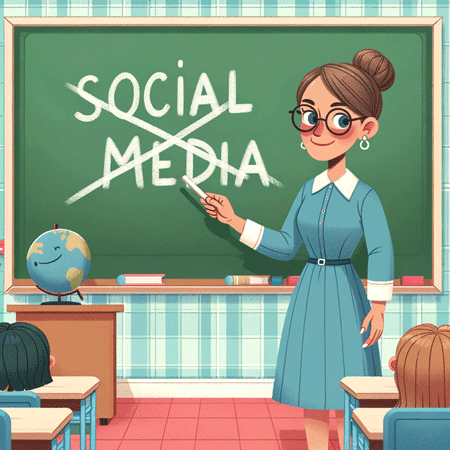Let’s stop calling it “social” media
Calling Facebook, Twitter/X, TikTok and the rest “social media” downplays the negative aspects of those services and platforms. What’s the alternative?
By Brad Berens

Image created by ChatGPT
We already know that words have power.
We know that non-Black people who use “the N word” are proclaiming themselves as racists. Decades ago, the LGBTQ+ community reclaimed “queer” as a positive identity tag instead of a slur. Today, we use “developmentally disabled” instead of “retarded.”
The startling recent rise of new pronouns is another example of how words can change reality, as is calling it “dead naming” when you use a trans person’s old name instead of the chosen new one in error or malice. In A Midsummer Night’s Dream, Shakespeare has Theseus talk about how a poet’s words give to an “airy nothing a local habitation and a name.”
Why, then, are we still referring to the services and platforms that include Facebook, Instagram, LinkedIn, Snap, TikTok, Threads, Twitter/X, and YouTube as “social media”?
The word “social” in the label is a misdirection, like a stage magician’s sleight of hand that pulls our gaze away from where the trick is happening. We don’t see the magician switch one playing card for another because she has caused a burst of smoke to appear in her other hand, and that’s where our attention goes.
Calling it “social media” distracts us from how everything that’s negative about these services and platforms has to do with the algorithms that seduce us into spending more time there than we planned, to consume and then spread misinformation, disinformation, and hate (e.g., the recent surge of antisemitism and islamophobia on Twitter/X), or to buy things that we don’t need and probably can’t afford.
Yes, the good parts of these services and platforms are the parts that connect us to people we like: years ago, my Mom got onto Facebook because she was tired of hearing from her secretary about the cute pictures of my kids that I’d share there.
For folks in the thought leadership business, these platforms and services help to build and maintain audiences—things like this column—which is another good thing.
But calling Facebook, Twitter/X and their ilk “social media” is like calling fried pork rinds, jumbo-sized boxes of malted milk balls, and high sucrose soft drinks “tasty food” instead of junk food. It’s an accurate but incomplete label.
Although there are folks who dislike the word “social” when the context is socialism or socialized medicine, many associations with the word are positive: it’s an adjective for “society,” a synonym for being friendly and outgoing, gregarious, chummy.
Referring to these platforms and services as “social media” suggests that these platforms are all about us as people. The label downplays how our role as consumers is what’s important to the companies that harvest our attention and then sell it to advertisers to make lots and lots of money. Plus, we’ve seen that capturing our attention is more important to these companies than other considerations like the truth and our mental health… the same way that profit is more important to fast food restaurants than helping patrons to be healthy.
Calling it “social media” is also becoming inaccurate. In an 11/17/23 Wall Street Journal article—“How Social Media Is Turning Into Old-Fashioned Broadcast Media: TikTok, YouTube and the rest of social media is looking a lot like mass media with content created with high production values”—Christopher Mims observed that:
A handful of accounts create most of the content that we see. Everyone else? They play the role of the audience, which is there to mostly amplify and applaud. The personal tidbits that people used to share on social media have been relegated to private group chats and their equivalent.
What should we call it instead?
We need another name to describe these platforms and services, a phrase that captures what algorithms do to us when they prey on our worst instincts instead of our best.
Compulsive Algorithmic Digital Media is one such phrase. It conveys the addictive (compulsive) quality, and the computer-generated personalization (algorithmic). “Digital” captures the scale of this media as well as its lack of the face-to-face friction of real life interactions that sometimes prompts us to slow down and think about what we’re saying and the people to whom we’re saying it.
Since nobody wants to use four words instead of two, we’ll wind up abbreviating Compulsive Algorithmic Digital Media to CAD Media. That, too, would downplay the negative parts, but I like the negative connotation of the word “cad” (a cheater, scoundrel, or reprobate) that emphasizes how these platforms and services don’t have our best interests at heart.
Words have power. Heightening our awareness of what these platforms and services provide might get CAD Media companies to change for the better.
__________

Brad Berens is the Center’s strategic advisor and a senior research fellow. He is principal at Big Digital Idea Consulting. You can learn more about Brad at www.bradberens.com, follow him on Post and/or LinkedIn, and subscribe to his weekly newsletter (only some of his columns are syndicated here).
See all columns from the Center.
November 29, 2023

